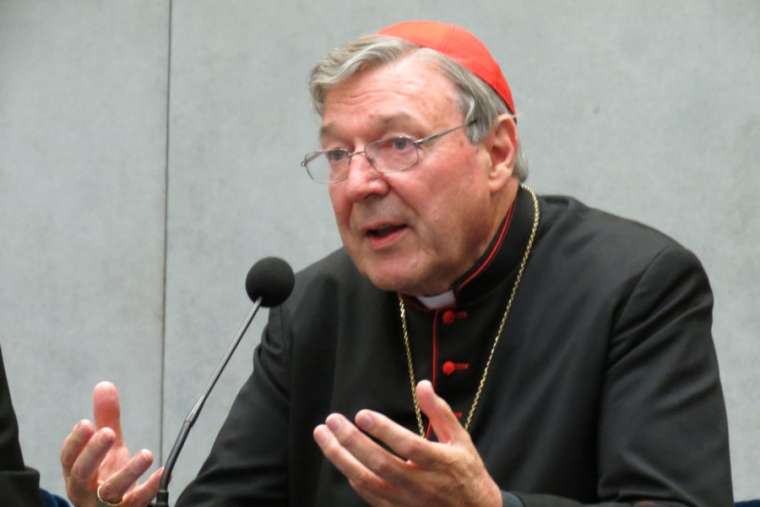Cardinal George Pell. Credit: Matthew Rarey/CNA
Cardinal George Pell has said that the Church’s spiritual mission is no excuse for bad management, and that financial corruption can pose a greater risk to clergy than sexual misconduct.
“Undoubtedly, money is one of God’s gifts, it is also a source of temptation,” Pell said in a video message delivered Tuesday evening to the Global Institute of Church Management at the Pontifical University of the Holy Cross in Rome.
“To say that the Church is not a business provides no justification for us to be inefficient much less for us to be corrupt.”
Pell, the founding patron of the institute, was appointed by Pope Francis in 2014 to serve as the first head of the Prefecture for the Economy in the Vatican, charged with overseeing and reforming Vatican finances.
“I remember being startled when I learned, soon after I came to Rome [in 2014], that Mother Teresa, St. Teresa of Calcutta, had said that for the clergy there are two great challenges: one touches on sexuality and another touched on money,” Pell recalled. “And she thought that the danger from money was greater and stronger than that from errant sexuality.”
“Our Lord himself has a lot to say about riches, he was very clear on the subject. Once again I remember being disconcerted, it may have been a decade or so ago, when I read that our Lord condemned the love of riches more than he condemned hypocrisy.”
The cardinal said “it is salutary to remember that the only group to whom Our Lord took the whip were the money changers, the traders in the temple.”
“Money is a tainted thing. I thoroughly enjoyed my work with money – it is quite fascinating – but it needs to be controlled and managed.”
“The Church is not a business,” Pell said, “the Church is supernatural […] but we believe in the incarnation, that God sent his only son to come and live with us. So we bring the presence of Christ and of God into our communities and we have to use money and methodology to do this.”
“I am not suggesting for a minute that our priorities should be inverted,” Pell said.
“I remember speaking at a big convention for youth… and I said it was harder to convert a person to Christ than to reform Vatican finances,” Pell recalled, noting that “all the secular press claimed I said the opposite.”
The cardinal praised the work of the institute and said that it is essential for those charged with management roles in the Church to foster discipline and virtue.
“It’s one thing to have a spiritual vision, it’s another thing to have a plan or a project; of course, to implement those things, you need managerial skill – human capacity which is trained and shaped for good and godly purposes.”
Pell’s term at the Prefecture for the Economy officially ended in 2019, but he took a leave of absence from the role in 2017 so that he could travel back to his native Australian to face charges of sexual abuse. After a protracted legal battle, which saw Pell spend more than a year in prison, much of it in solitary confinement, the cardinal was acquitted of all charges by the Australian High Court in April of this year.
Pell offered examples from his time spent in prison as ways in which physical self-discipline can compliment spiritual discipline.
“In jail,” Pell said, “I had plenty of time on my hands to pray every day, and that I did. I did it because it was my duty, it was congruent, and personally helpful. But alongside that, I had a set of practical steps to take.”
“My life was very regular – I was woken every morning at 7.15 and I didn’t go back to bed, I stayed up,” Pell said. “I made certain that I took exercise every day, I looked after my diet; I was probably healthier when I came out of jail than when I went in.”
“All these ordered, systematic facts helped me,” said Pell.
“Similarly, when we come to look at Church enterprises, the way we serve the people, it isn’t sufficient to be regularly praying, persons of strong fervor – we have to be able to put our vision into action.”

